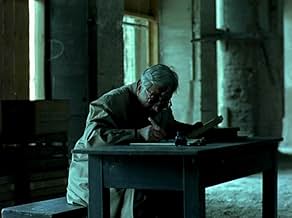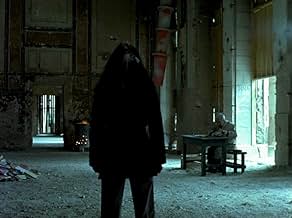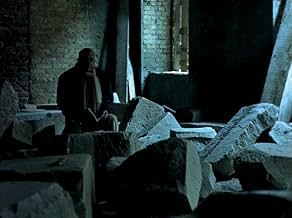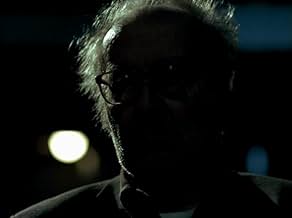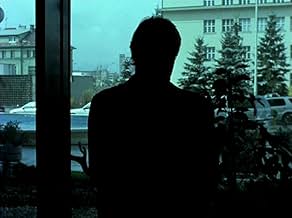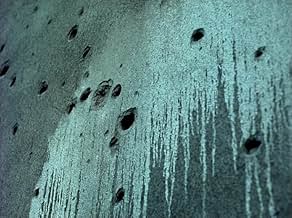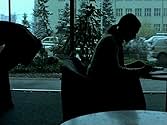IMDb RATING
6.8/10
3.3K
YOUR RATING
An indictment of modern times divided into three "kingdoms": "Enfer" ("Hell"), "Purgatoire" ("Purgatory") and "Paradis" ("Paradise").An indictment of modern times divided into three "kingdoms": "Enfer" ("Hell"), "Purgatoire" ("Purgatory") and "Paradis" ("Paradise").An indictment of modern times divided into three "kingdoms": "Enfer" ("Hell"), "Purgatoire" ("Purgatory") and "Paradis" ("Paradise").
- Awards
- 1 win & 6 nominations total
- Director
- Writer
- All cast & crew
- Production, box office & more at IMDbPro
6.83.2K
1
2
3
4
5
6
7
8
9
10
Featured reviews
Notre Musique
Leave it up to Monsieur Godard to shoot his first film to directly address the Palastineans since Ici et ailleurs in '76 in Sarajevo with a cast that includes US Marines, Native Americans in full traditional regalia, and Godard himself in counter-sermonizing flesh. At least, and this is much more than trivial record keeping, the maestro has found a way to render his digital photography as gorgeous as the celluloid variety for which he is well known. The quality of the video images takes Notre Musique miles beyond the wan DV sections in Éloge de l'amour. This is all the more interesting considering his response, during the film's central writer's conference, to a question concerning whether or not digital cameras can save cinema. Godard stares into his DV lense and says nothing; the question cannot have an answer other than the one to be provided, immanently, vis-a-vis the unwinding of our collective species activity. Godard, as always, is best when he resists the unavailing temptation to answer the questions which constitute him as one of the most compelling artists of the 20th Century. Though his autodidactic flights of fancy may fail to soar as solidly as before, his discourses remain ultimately profound, his metaphors as unstintingly powerful as ever, his plagiarism as unflappable. He has begun to rely again on Borges, which is always good, and there is much less Merleau-Ponty. The only major flaw of the film is the opening section "Hell" (yes, Dante is backstage here folks), in which the montage is more of a groantage, in the manner of a Baraka (God no!) more than anything Eisenstein might recognize as dialectical. "Heaven", however, is wonderful. All Godard does is take the US Marine anthem at its word.
film as literature
There are movies to help you relax on a Saturday night and there are movies that stimulate, even if that means asking questions that have no answers. I didn't understand this movie but I still felt stimulated by its questions. I tried so hard to make the connections and I had a lot of trouble. But you don't read Portrait of the Artist as a Young Man once without discussing it and expect to understand it. Nor is the more accessible Three Colors Trilogy meant to be seen only once for complete understanding. The quality of a movie is not determined by its accessibility. It's a limited understanding of the medium to judge film by its accessibility. It can be more than an easy way to relax. It can be the impetus to dialogue. I cared about this movie because I didn't understand it.
Our Music-2004: Poses unanswerable questions that fail to support the conclusion.
This is not entertainment...
I'd seen Contempt (1963) and Breathless (1960) many years ago and thoroughly enjoyed both. After 1964, I sort missed all that he directed until now, which appeared on late-night TV. And no wonder it was on so late at night...
It seems that, as many of us get older and maybe wiser, we like to expound on things philosophical. Bergman did it well, and without resorting to didactic circularity or confusion and still managed to tell a good story. Woody Allen uses satire brilliantly for the same purpose.
However, Godard here uses the bare bones of a simple, quasi-documentary style story and one that it episodically fractured and with much symbolism to reflect upon 'what it all means': that is, life, death and the whole damn thing. Using the current Israeli problem with Palestine and vice-versa, he explores the three concepts of Hell, Purgatory and Heaven, using each to show what humanity has done, what it's doing and where it should be going, respectively.
The first, Hell, is obvious: with a montage of cuts from a multitude of news and film clips, Godard shows us the extent to which we prey upon each other even as we pray for each other. So, there are some real all too real scenes of the dead, the dying and the executed during the many wars that have been documented during the last hundred years or so. Nothing new here at all...
The second, Purgatory (a place for waiting), is well an exposition about waiting: waiting for a bus, for a train, for a plane, for a meeting to start, for a bridge to be rebuilt, for a nation to recover from war, for people to begin to understand each other. And this is all done within the thin framework of the story of Olga (Nade Dieu), the Jewish journalist from Tel Aviv who is attending a lecture by Godard (playing himself) in Sarajevo, and who is trying to understand why human problems cannot seem to be resolved, no matter what. Significantly, by choosing just Olga, Godard has certainly brought his philosophy to a very personal level, and one with which we can all identify, more or less.
All of that is rendered moot when Olga appears to commit an unspeakable act when she returns to Tel Aviv. Perhaps Godard should have told her that it's not the end that matters but the journey to achieve that end?
The third the shortest vignette is our final destination: as a prisoner of Nature, complete with - American! - border guards who let Olga through to join the happy throng. Essentially: strip off civilization and return to our basics to find out who we really are...
I think I'll stick with tackling prejudice, reducing global warming and trying to make a positive difference rather than taking Olga's choice.
It's well filmed, as you'd expect from Godard; the music is, at times, quite beautiful to hear; and the Sarajevo mise-en-scene is a stark reminder of our collective sins. An annoying aspect for me, however, is that not all dialog was translated and subtitled; perhaps it wasn't necessary?
So, while interesting visually and aurally, I'd recommend this only for those who like to reflect upon existential problems within philosophy.
I'd seen Contempt (1963) and Breathless (1960) many years ago and thoroughly enjoyed both. After 1964, I sort missed all that he directed until now, which appeared on late-night TV. And no wonder it was on so late at night...
It seems that, as many of us get older and maybe wiser, we like to expound on things philosophical. Bergman did it well, and without resorting to didactic circularity or confusion and still managed to tell a good story. Woody Allen uses satire brilliantly for the same purpose.
However, Godard here uses the bare bones of a simple, quasi-documentary style story and one that it episodically fractured and with much symbolism to reflect upon 'what it all means': that is, life, death and the whole damn thing. Using the current Israeli problem with Palestine and vice-versa, he explores the three concepts of Hell, Purgatory and Heaven, using each to show what humanity has done, what it's doing and where it should be going, respectively.
The first, Hell, is obvious: with a montage of cuts from a multitude of news and film clips, Godard shows us the extent to which we prey upon each other even as we pray for each other. So, there are some real all too real scenes of the dead, the dying and the executed during the many wars that have been documented during the last hundred years or so. Nothing new here at all...
The second, Purgatory (a place for waiting), is well an exposition about waiting: waiting for a bus, for a train, for a plane, for a meeting to start, for a bridge to be rebuilt, for a nation to recover from war, for people to begin to understand each other. And this is all done within the thin framework of the story of Olga (Nade Dieu), the Jewish journalist from Tel Aviv who is attending a lecture by Godard (playing himself) in Sarajevo, and who is trying to understand why human problems cannot seem to be resolved, no matter what. Significantly, by choosing just Olga, Godard has certainly brought his philosophy to a very personal level, and one with which we can all identify, more or less.
All of that is rendered moot when Olga appears to commit an unspeakable act when she returns to Tel Aviv. Perhaps Godard should have told her that it's not the end that matters but the journey to achieve that end?
The third the shortest vignette is our final destination: as a prisoner of Nature, complete with - American! - border guards who let Olga through to join the happy throng. Essentially: strip off civilization and return to our basics to find out who we really are...
I think I'll stick with tackling prejudice, reducing global warming and trying to make a positive difference rather than taking Olga's choice.
It's well filmed, as you'd expect from Godard; the music is, at times, quite beautiful to hear; and the Sarajevo mise-en-scene is a stark reminder of our collective sins. An annoying aspect for me, however, is that not all dialog was translated and subtitled; perhaps it wasn't necessary?
So, while interesting visually and aurally, I'd recommend this only for those who like to reflect upon existential problems within philosophy.
well intentioned but lacks depth (even though it seems the opposite)
It is sometimes hard for creative and well meaning filmmakers to accept the fact that their political and philosophical understanding of the world might not be as rounded as their movie making skills. Godard shows in this excruciating film that he clearly falls into this category of filmmakers. 'Notre Musique' is well intentioned, for sure. Godard seeks to obfuscate the lines between reality and drama, the sensible and the absurd (heaven guarded by US marines). In doing so, however, the film becomes Godard's 'international politics explained' more than an engaging piece of cinema. Being a visual medium as it is, cinema needs to add layers of subtlety to what's seen (so that we look beyond that which is seen), in order to be not only an effective messenger but also an exercise in self-exploration. 'Notre Musique' is a blaring loudspeaker with Godard in control of the microphone.
Insights on War and Memory Amidst the Gauloise Smoke
"Notre Musique" could be either a late night college bull session or one of those Monty Python skits where historical warmongers sit around rationally comparing their various atrocities with a coolly objective BBC moderator.
Maybe it's a French intellectual's reality show pitch: we'll set up a dialog between a Jew and a Palestinian at a literary meeting in bombed-out Sarajevo as observed by living ghost Native Americans after bombarding them with images of war and genocide through 19th and 20th century history.
Amidst this trumped-up pretentiousness, Godard the filmmaker does make some good points about war and memory. While the historical images, both from fiction and journalism, are colorized to contemporize them, one easily concedes, yeah, war is hell and hey didn't "Saving Private Ryan" prove that to us, when Godard cannily trumps that thought by discussing how war in fiction - from legend and poetry to movies -- touches people more than the reality.
Then just as you're about to protest, hey, you're showing all these war images without their raison d'etre, Godard springs into a profound verbal and visual illustration of the importance of context, leading to an appreciation of how history is written by the victors. The points about the impact on Western psyche of the Trojans from Homer's perspective were more insightful than all of the "Troy" movie.
However, those debaters that are translated in the subtitles talk in didactic epigrams that will make more sense when one can rewind the DVD for reflection (including the explanation of the title). The French intellectual smug superiority gets annoying -- we don't see any images of WW II collaborators vs. Resistance fighters, let alone colonial legacy issues in Algeria or Muslims in France today.
While I'm not sure if the images of discarded books amidst the ruins of war were about the hopelessness of literature and the arts or its unquenchable survival as some are salvaged, Godard has an intellectual's faith in the power of dialog (and cigarette smoking), though pessimistic about the ability of the media to communicate it effectively, as he sets up an overly freighted discussion between an idealistic and ambitious young Israeli woman of Russian descent, whose grandparents were saved from the Holocaust by a Righteous Gentile, and an articulate Palestinian writer, as translated by another Wandering French/Israeli Jew.
I think he was also trying to incorporate suicide bombers into the trajectory of French intellectual thought from Durkheim to Camus that sees it as an existential act of protest against anomie, but well, Jean Luc, we can't all be French.
Typical for a Godard film, the woman to my right gushed that it was her second screening and it was her favorite of his films, and the woman on my left said she couldn't figure out what it was about.
Maybe it's a French intellectual's reality show pitch: we'll set up a dialog between a Jew and a Palestinian at a literary meeting in bombed-out Sarajevo as observed by living ghost Native Americans after bombarding them with images of war and genocide through 19th and 20th century history.
Amidst this trumped-up pretentiousness, Godard the filmmaker does make some good points about war and memory. While the historical images, both from fiction and journalism, are colorized to contemporize them, one easily concedes, yeah, war is hell and hey didn't "Saving Private Ryan" prove that to us, when Godard cannily trumps that thought by discussing how war in fiction - from legend and poetry to movies -- touches people more than the reality.
Then just as you're about to protest, hey, you're showing all these war images without their raison d'etre, Godard springs into a profound verbal and visual illustration of the importance of context, leading to an appreciation of how history is written by the victors. The points about the impact on Western psyche of the Trojans from Homer's perspective were more insightful than all of the "Troy" movie.
However, those debaters that are translated in the subtitles talk in didactic epigrams that will make more sense when one can rewind the DVD for reflection (including the explanation of the title). The French intellectual smug superiority gets annoying -- we don't see any images of WW II collaborators vs. Resistance fighters, let alone colonial legacy issues in Algeria or Muslims in France today.
While I'm not sure if the images of discarded books amidst the ruins of war were about the hopelessness of literature and the arts or its unquenchable survival as some are salvaged, Godard has an intellectual's faith in the power of dialog (and cigarette smoking), though pessimistic about the ability of the media to communicate it effectively, as he sets up an overly freighted discussion between an idealistic and ambitious young Israeli woman of Russian descent, whose grandparents were saved from the Holocaust by a Righteous Gentile, and an articulate Palestinian writer, as translated by another Wandering French/Israeli Jew.
I think he was also trying to incorporate suicide bombers into the trajectory of French intellectual thought from Durkheim to Camus that sees it as an existential act of protest against anomie, but well, Jean Luc, we can't all be French.
Typical for a Godard film, the woman to my right gushed that it was her second screening and it was her favorite of his films, and the woman on my left said she couldn't figure out what it was about.
Did you know
- Quotes
Olga Brodsky: If anyone understands me, then I wasn't clear.
- ConnectionsEdited from Angels of Sin (1943)
- SoundtracksDas Buch der Klänge
Composed by Hans Otte
- How long is Our Music?Powered by Alexa
Details
- Release date
- Countries of origin
- Official sites
- Languages
- Also known as
- Müziğimiz
- Filming locations
- Production companies
- See more company credits at IMDbPro
Box office
- Gross US & Canada
- $139,922
- Opening weekend US & Canada
- $8,210
- Nov 28, 2004
- Gross worldwide
- $293,681
Contribute to this page
Suggest an edit or add missing content

